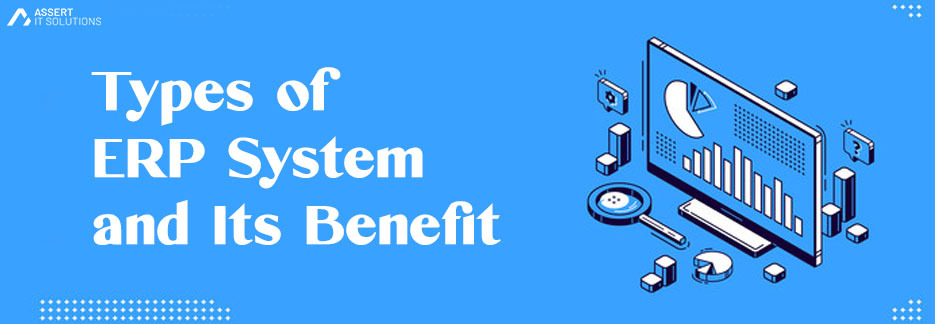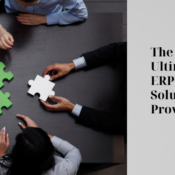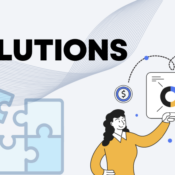Types of ERP System and Its Benefits

02/28/2022
/
Types of ERP System and Its Benefits
Do you have any prior experience in running a full-fledged business with catering to all its branches in a productive way? Check out the different types of ERP System in this blog to pick a suitable one for your business.
A powerful business tool is used to integrate all the processes required to run a business. ERP stands for enterprise resource planning software that helps businesses strategize and handle their daily activities like manufacturing, services, and finances.
 Here are the three most common types of ERP software that perform with different deployment models:
On-Premise ERP Software: Software that is implemented within the workspace is managed by the organization on their servers. It offers security and control to the organization to connect with their workers, processes, and systems.
Cloud-Based ERP Software: It is also known as software as a service (SaaS), which is used by organizations to access the software application and store data via the internet. With cloud-based ERP, a warehouse manager can log in from a mobile or desktop device to go through the deal, check inventory, and generate quotations or whatever is required. It eliminates the need to rummage through piles of files scattered across a desktop or even on a desk. It’s time to buckle up your business for seamless automation and faster scalability.
Hybrid ERP Software: The two-tier model is a combination of On-premise and Cloud-based ERP software. The main purpose of this model is to provide the core building block for the entire digital platform and supports real-time reporting, analytics, high-velocity transactions, and content-rich transaction.
Here are the three most common types of ERP software that perform with different deployment models:
On-Premise ERP Software: Software that is implemented within the workspace is managed by the organization on their servers. It offers security and control to the organization to connect with their workers, processes, and systems.
Cloud-Based ERP Software: It is also known as software as a service (SaaS), which is used by organizations to access the software application and store data via the internet. With cloud-based ERP, a warehouse manager can log in from a mobile or desktop device to go through the deal, check inventory, and generate quotations or whatever is required. It eliminates the need to rummage through piles of files scattered across a desktop or even on a desk. It’s time to buckle up your business for seamless automation and faster scalability.
Hybrid ERP Software: The two-tier model is a combination of On-premise and Cloud-based ERP software. The main purpose of this model is to provide the core building block for the entire digital platform and supports real-time reporting, analytics, high-velocity transactions, and content-rich transaction.
 Today, in the business world, it is impossible to ignore the effect of ERP. The main advantage of ERP is that it helps businesses of all sizes to improve their growth and productivity. Here are some business values of ERP:
Today, in the business world, it is impossible to ignore the effect of ERP. The main advantage of ERP is that it helps businesses of all sizes to improve their growth and productivity. Here are some business values of ERP:
 These two tools are the most powerful tool for any business. ERP handles the organization's activities like order placement, tracking, billing, and supply chain. While CRM (Customer relationship management) controls the marketing, sales, customer service management and carries out other activities such as creating a marketing campaign, recording customer interaction, sales tracking, and many other business activities. Now that you know its usage, you can select Types of ERP System easily for better outcomes.
These two tools are the most powerful tool for any business. ERP handles the organization's activities like order placement, tracking, billing, and supply chain. While CRM (Customer relationship management) controls the marketing, sales, customer service management and carries out other activities such as creating a marketing campaign, recording customer interaction, sales tracking, and many other business activities. Now that you know its usage, you can select Types of ERP System easily for better outcomes.
 Critical business functions including finance, sales and marketing, manufacturing, project management, customer communication, inventory and order management, finance/accounting and human resources require a professional uplift. All you need is picking a definitive one from different types of ERP System. These tasks, when automated, allow you and your staff to pay attention on other tasks to add more value to work.
Critical business functions including finance, sales and marketing, manufacturing, project management, customer communication, inventory and order management, finance/accounting and human resources require a professional uplift. All you need is picking a definitive one from different types of ERP System. These tasks, when automated, allow you and your staff to pay attention on other tasks to add more value to work.
In general, an ERP automates business processes, collects and organizes key business information and provides more internal controls, intensifies insights by drawing everything to a centrally operated database. This database can be accessed from various departments to modulate tasks and operations. Some of the key verticals are accounting, manufacturing, supply chain management, sales, marketing and human resources (HR).
A complete suite of ERP involves enterprise performance management to give an advantage to the organizations to carry out the plan, budget, and accurate information about the organization's financial results. The main objective of ERP is to manage and improve all business resources and to develop the resources for enhancing business growth and productivity. It is an integrated system that governs real-time operations to support the users.Types of ERP Systems
 Here are the three most common types of ERP software that perform with different deployment models:
On-Premise ERP Software: Software that is implemented within the workspace is managed by the organization on their servers. It offers security and control to the organization to connect with their workers, processes, and systems.
Cloud-Based ERP Software: It is also known as software as a service (SaaS), which is used by organizations to access the software application and store data via the internet. With cloud-based ERP, a warehouse manager can log in from a mobile or desktop device to go through the deal, check inventory, and generate quotations or whatever is required. It eliminates the need to rummage through piles of files scattered across a desktop or even on a desk. It’s time to buckle up your business for seamless automation and faster scalability.
Hybrid ERP Software: The two-tier model is a combination of On-premise and Cloud-based ERP software. The main purpose of this model is to provide the core building block for the entire digital platform and supports real-time reporting, analytics, high-velocity transactions, and content-rich transaction.
Here are the three most common types of ERP software that perform with different deployment models:
On-Premise ERP Software: Software that is implemented within the workspace is managed by the organization on their servers. It offers security and control to the organization to connect with their workers, processes, and systems.
Cloud-Based ERP Software: It is also known as software as a service (SaaS), which is used by organizations to access the software application and store data via the internet. With cloud-based ERP, a warehouse manager can log in from a mobile or desktop device to go through the deal, check inventory, and generate quotations or whatever is required. It eliminates the need to rummage through piles of files scattered across a desktop or even on a desk. It’s time to buckle up your business for seamless automation and faster scalability.
Hybrid ERP Software: The two-tier model is a combination of On-premise and Cloud-based ERP software. The main purpose of this model is to provide the core building block for the entire digital platform and supports real-time reporting, analytics, high-velocity transactions, and content-rich transaction.
How does ERP Improve and Benefit Business Value?
 Today, in the business world, it is impossible to ignore the effect of ERP. The main advantage of ERP is that it helps businesses of all sizes to improve their growth and productivity. Here are some business values of ERP:
Today, in the business world, it is impossible to ignore the effect of ERP. The main advantage of ERP is that it helps businesses of all sizes to improve their growth and productivity. Here are some business values of ERP:
- Improve Business Insight: Helps in generating accurate reports through real-time data.
- Improve ROI efficiency: As a result of integrated and automated ERP software, increased business efficiency, and productivity.
- Enhance Collaborations: ERP software help businesses to improve supply chain and distribution network stability. It enhances collaborations from the user information shared in contracts, product requisitions, and purchase orders.
- Improved Efficiency and Scalability: A well-defined business process and function increase the users' experience with streamlined operations that grow your business.
- Reduce Risk: ERP software helps in reducing human errors that improve data integrity and reduce the risk.
ERP and CRM Integration Benefits
 These two tools are the most powerful tool for any business. ERP handles the organization's activities like order placement, tracking, billing, and supply chain. While CRM (Customer relationship management) controls the marketing, sales, customer service management and carries out other activities such as creating a marketing campaign, recording customer interaction, sales tracking, and many other business activities. Now that you know its usage, you can select Types of ERP System easily for better outcomes.
These two tools are the most powerful tool for any business. ERP handles the organization's activities like order placement, tracking, billing, and supply chain. While CRM (Customer relationship management) controls the marketing, sales, customer service management and carries out other activities such as creating a marketing campaign, recording customer interaction, sales tracking, and many other business activities. Now that you know its usage, you can select Types of ERP System easily for better outcomes.
Here are some benefits of integrated ERP and CRM
Consolidation of Customer Data:
The work of ERP and CRM is to store the entire cross-departmental information, whether an inventory is pulled, email is sent to clients or payment is posted. Rather than storing and updating the same information into different software, you can keep the information in one location by this integrated ERP and CRM software.Cut-down Data Replication:
The important issue that comes while working on ERP and CRM software is data duplication. This all integrated software reduces data duplication as CRM & ERP works with the same rule and structure.Increased Visibility and Sale Forecasting:
Integrated ERP and CRM create a centralized point for the product, order, and invoice creation. It helps in improving the sales' visibility and helps in making and tracking changes. In the case of sales forecasting, it provides accurate real-time customer and sale data that improves forecasting.Improved Order and Quoting:
Sales reps can take proposals from the CRM and turn them directly into the order in ERP software. It improves the organization's efficiency as it does not involve any change and re-entering process in multiple locations.Better Decision Making
The final call is always the priority. Having a common database makes decision taking easy as everyone can access the same page. Instant availability or access to data reduces the reasons for conflicts and companies can generate reports automatically with a single click. Improved collaboration simplifies purchase orders, contracts and customer-support records and other associated tasks in real-time.Who Should Use ERP?
 Critical business functions including finance, sales and marketing, manufacturing, project management, customer communication, inventory and order management, finance/accounting and human resources require a professional uplift. All you need is picking a definitive one from different types of ERP System. These tasks, when automated, allow you and your staff to pay attention on other tasks to add more value to work.
Critical business functions including finance, sales and marketing, manufacturing, project management, customer communication, inventory and order management, finance/accounting and human resources require a professional uplift. All you need is picking a definitive one from different types of ERP System. These tasks, when automated, allow you and your staff to pay attention on other tasks to add more value to work.
Wrap Up:
With the latest and emerging technology, all businesses are adopting ERP software for better growth and productivity. Through this ERP software, an organization can easily automate the process that requires lots of effort, such as reuniting the financial accounts. Choose your deployment model from different types of ERP System and grow your business unprecedentedly. You can choose the best ERP software by comparing the ERP software price through ERP packages and get the best ERP Solutions at Assert IT Solutions at the best affordable prices.Recent Posts
Monika Narriya/0 Comments
Why are ERP solutions important in the education sector?
Monika Narriya/0 Comments
Which is the best ERP solution provider company?
Monika Narriya/0 Comments
How do we select the right ERP solution for our businesses?
Sumit Kumar/0 Comments
9 Most In-Demand Programming Languages for 2024
Sumit Kumar/0 Comments
Best Time to Post on Social Media – 2024 Guide
Sumit Kumar/0 Comments
Why You Should Consider Semantic HTML for SEO
All Categories
- Bing
- Blockchain
- Blog
- Branding
- Case Study
- Content Marketing
- Conversion Rate Optimization
- Cryptocurrency
- Digital Currency
- Digital Marketing
- Email Marketing
- ERP Solutions
- Facebook Marketing
- Google Ads
- Google Updates
- Graphic Designing
- Hire Developers
- Image SEO
- Influencer Marketing
- IT
- Local SEO
- Machine Learning
- Mobile Application Development
- Pay Per Click
- Pinterest SEO
- Podcast Hosting
- React JS
- Reddit & Quora
- Search Engine Optimization
- SEO Copywriting
- Social Media Marketing
- Software
- Software Development
- Technology
- UX and UI
- Web Designs
- Web Hosting
- Website Development
- Website Redesigning
- YouTube SEO








